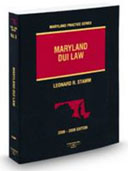Recently, the Maryland Court of Appeals considered the case of Najafi v. Motor Vehicle Administration (MVA). After Najafi had been arrested for DUI, he asked to be able to make a private call to his lawyer to help him to decide whether to submit to a breath test. He requested that he be given privacy to make the call, but the officer said he couldn’t allow that. He tried to call his lawyer but only got an answering machine. He never submitted to a breath test and his license was suspended at an MVA hearing.
In the Court of Appeals he argued that because the officer said he could not have a private phone call he was denied his constitutional right to contact a lawyer and therefore his license should not have been suspended. The MVA argued that while a person detained on suspicion of drunk driving does have the right to contact a lawyer to decide whether to submit to a breath test, they argued that the denial of that right can only be raised as a defense in court, not at an MVA hearing. The Court of Appeals held that since the officer allowed him to call his lawyer, it was unnecessary to reach that issue. The Court also held that there was sufficient evidence for the administrative law judge (ALJ) to conclude Najafi had refused the test.
Although the Court did not reach the issue of whether denial of counsel could be raised at an MVA hearing, it intimated in dicta that it could not. An “obiter dictum” is a “judicial comment made while delivering a judicial opinion, but one that is unnecessary to the decision in the case and therefore not precedential (although it may be considered persuasive)” according to Black’s Law Dictionary. For a number of reasons, I believe this dictum is mistaken, and continue to argue at MVA hearings that denial of counsel is a valid defense.
In Sites v. State the Maryland Court of Appeals first held that a person detained on suspicion of drunk driving has a due process right, if they ask for it, to be able to call a lawyer to help decide whether to submit to a test for alcohol. As a result, the Court held the State could not use an alcohol test in evidence where the arrestee was denied the opportunity to contact counsel. The Court most significantly said:
By affording a suspect the power to refuse chemical testing, Maryland’s implied consent statute deliberately gives the driver a choice between two different potential sanctions, each affecting vitally important interests. Indeed, revocation of a driver’s license may burden the ordinary driver as much or more than the traditional criminal sanctions of fine or imprisonment. The continued possession of a driver’s license, as the Supreme Court has said, may become essential to earning a livelihood; as such, it is an entitlement which cannot be taken without the due process mandated by the Fourteenth Amendment. See Dixon v. Love, 431 U.S. 105, 97 S.Ct. 1723, 52 L.Ed.2d 172 (1977); Bell v. Burson, 402 U.S. 535, 91 S.Ct. 1586, 29 L.Ed.2d 90 (1971). Considering all the circumstances, we think to unreasonably deny a requested right of access to counsel to a drunk driving suspect offends a sense of justice which impairs the fundamental fairness of the proceeding. We hold, therefore, that the due process clause of the Fourteenth Amendment, as well as Article 24 of the Maryland Declaration of Rights, requires that a person under detention for drunk driving must, on request, be permitted a reasonable opportunity to communicate with counsel before submitting to a chemical sobriety test, as long as such attempted communication will not substantially interfere with the timely and efficacious administration of the testing process.
In cases after Sites, the Court of Appeals further refined this right to call a lawyer before deciding whether to take a test. In Brosan v. Cochran the Court held a lawyer could come to the jail and give advice in person to the person arrested. In McAvoy v. State, the Court held that an officer need not tell the person arrested of this right to counsel, but the right is contingent on the arrestee requesting counsel. In MVA v. Atterbeary, the Court said asking for a lawyer does not equal a refusal to take a test.
Given these holdings, and that the potential loss of a job as a result of a license suspension was the primary reason for the Court’s ruling in Sites, it does not make sense to say that a defense that the officer denied the person counsel can only be raised as a defense in court to prevent the judge or jury from considering a test result or refusal but it cannot be raised as a defense at an MVA hearing to prevent a suspension of a drivers’ license.
If you are facing serious traffic charges in Maryland call Leonard R. Stamm or Johanna Leshner of Goldstein & Stamm, P.A. at 301-345-0122 for a free consultation.
Leonard R. Stamm Goldstein & Stamm, P.A.
6301 Ivy Lane, Suite 504 Greenbelt, Maryland 20770 www.lstamm.com
301-345-0122 (fax) 301-441-4652
Author: West’s Maryland DUI Law

 Maryland DUI Lawyer Blog
Maryland DUI Lawyer Blog

